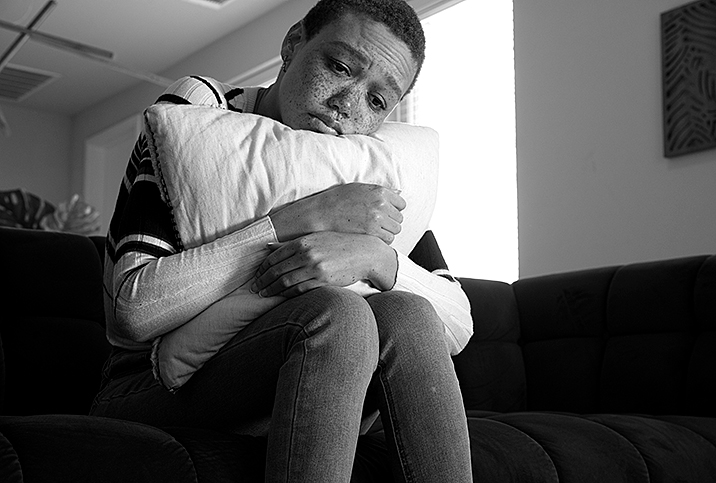It's Time to Take Women's Pain Seriously

For decades, women's pain has been misdiagnosed, mistreated and written off. That needs to end.
I'm one of the lucky ones. I do not have endometriosis, but so many women in my life do, and their stories are harrowing. The below accounts are from real women dealing with endometriosis who suffered years of trying to manage their pain and fighting to be heard before getting a proper diagnosis.
Katie's story
Katie Clark went seven years being told her heavy periods and extreme pain were caused by stress due to being a mother.
"I had three colposcopies in one year. I had doctors tell me I was in pain because I was a mom and stressed. I had doctors suggest that maybe I had an STD, despite being in a monogamous marriage," Clark said. "I went to ERs where I got eye-rolls, prescriptions for random medication cocktails that made me miserable, and then sent on my way without even a suggestion of a follow-up. I felt crazy. I had another child, and things got even worse after him. I couldn't even get up off the couch many days during the month. My husband felt helpless, and I felt like I was just a big whiner because my doctors kept saying nothing was wrong."
After her sister mentioned endometriosis, Clark started researching it. She also looked for new-doctor recommendations and found one through a Facebook group.
"When I saw him, within about 20 minutes of talking to me and doing a physical exam, he told me he would be shocked if I didn't have endometriosis," Clark said. "Since I was having trouble getting pregnant, he suggested that I get the surgery, so I booked it for a few months later. Having him validate my pain and tell me I wasn't crazy was an experience I'll never forget."
Clark said all the years of pain and being told it was all in her head was worth it for the moment she was told the surgeons found endometriosis.
Melissa's story
Melissa Randazzo's story isn't any easier to hear. In similar fashion, Melissa spent a year having extremely painful periods and being told to suck it up until, finally, a diagnosis came.
"I ended up in the ER one night as my fallopian tubes filled up with fluid. I was told I needed surgery right away. During my surgery, I was diagnosed with stage IV endometriosis and wound up losing both of my fallopian tubes. It was because my last doctor did not take me or my pain seriously, and did not do anything about it, that I wound up losing my fallopian tubes in my mid-20s," Randazzo said. "I was told that getting pregnant with this diagnosis would be very difficult, but not impossible. After two rounds of IVF, I was able to get pregnant with my first little miracle, Gaspare."
Randazzo recently gave birth to a second child, Lucy, also through IVF.
Donna's story
Donna F. Brown considers herself an expert on this topic—not by choice. She started menstruating at the age of 12, and would experience severe pain and heavy bleeding for more than a week.
"I saw several doctors who told me it was just part and parcel of being a woman. They would tell me to take Advil or Naprosyn and rest. How do you rest when your belly is in agonizing pain and it feels like a bowling ball is stuck in your uterus? I endured this monthly agony until I was in my mid-40s, when one astute gynecologist I saw actually took the extra step to diagnose endometriosis, yet my suffering didn't end there," Brown said.
After consulting with multiple female doctors in the mid-1990s about undergoing hysterectomy surgery, Brown decided to move forward with a conservative hysterectomy, which allows the patient to keep the ovaries and avoid inducing menopause.
"Unfortunately, the surgeon who performed the hysterectomy removed the ovaries as well, explaining the endometriosis had also spread to the ovaries," Brown continued. "To make matters worse, I developed severe tinnitus. I had hoped to avoid menopause and try to take herbal supplements, yet this doctor never informed me that in surgical menopause, you need estrogen."
There are three major things Brown learned from her experience that she wants other women to know:
- Women need to take control of their body and health by educating themselves on all women's health matters.
- The cure isn't always better than the condition you're trying to cure.
- When in doubt, refer back to point one.
Women's pain is real. It's not always just stress. Or motherhood. Or easily solved with Advil and a nap. As evidenced by these women, and many more women around the world, endometriosis pain is real. It's not all in your head.
Empower yourself through health education, and look into online forums or groups of other women who know exactly what you're going through. Understanding your symptoms and experiences can help identify the pain and equip you to discuss it seriously with your doctor.


















